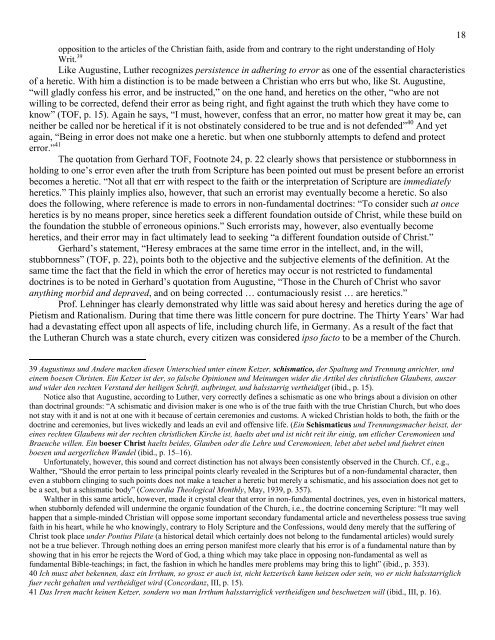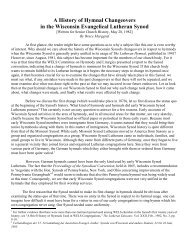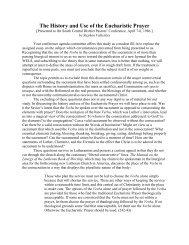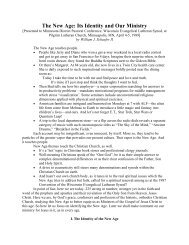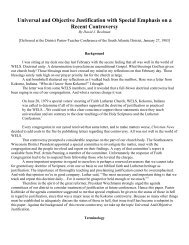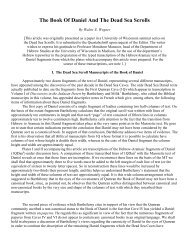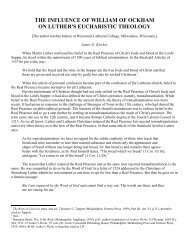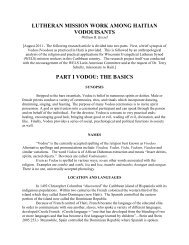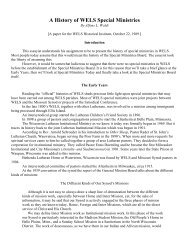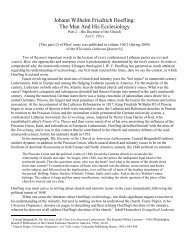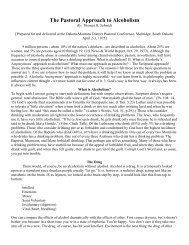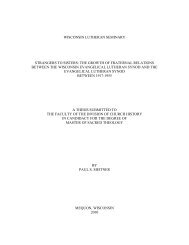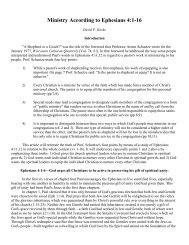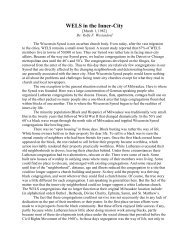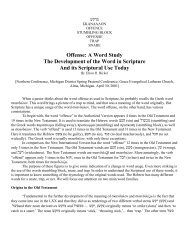What Is Heresy? - Wisconsin Lutheran Seminary Library: Essays
What Is Heresy? - Wisconsin Lutheran Seminary Library: Essays
What Is Heresy? - Wisconsin Lutheran Seminary Library: Essays
You also want an ePaper? Increase the reach of your titles
YUMPU automatically turns print PDFs into web optimized ePapers that Google loves.
opposition to the articles of the Christian faith, aside from and contrary to the right understanding of Holy<br />
Writ. 39<br />
Like Augustine, Luther recognizes persistence in adhering to error as one of the essential characteristics<br />
of a heretic. With him a distinction is to be made between a Christian who errs but who, like St. Augustine,<br />
“will gladly confess his error, and be instructed,” on the one hand, and heretics on the other, “who are not<br />
willing to be corrected, defend their error as being right, and fight against the truth which they have come to<br />
know” (TOF, p. 15). Again he says, “I must, however, confess that an error, no matter how great it may be, can<br />
neither be called nor be heretical if it is not obstinately considered to be true and is not defended” 40 And yet<br />
again, “Being in error does not make one a heretic. but when one stubbornly attempts to defend and protect<br />
error.” 41 The quotation from Gerhard TOF, Footnote 24, p. 22 clearly shows that persistence or stubbornness in<br />
holding to one’s error even after the truth from Scripture has been pointed out must be present before an errorist<br />
becomes a heretic. “Not all that err with respect to the faith or the interpretation of Scripture are immediately<br />
heretics.” This plainly implies also, however, that such an errorist may eventually become a heretic. So also<br />
does the following, where reference is made to errors in non-fundamental doctrines: “To consider such at once<br />
heretics is by no means proper, since heretics seek a different foundation outside of Christ, while these build on<br />
the foundation the stubble of erroneous opinions.” Such errorists may, however, also eventually become<br />
heretics, and their error may in fact ultimately lead to seeking “a different foundation outside of Christ.”<br />
Gerhard’s statement, “<strong>Heresy</strong> embraces at the same time error in the intellect, and, in the will,<br />
stubbornness” (TOF, p. 22), points both to the objective and the subjective elements of the definition. At the<br />
same time the fact that the field in which the error of heretics may occur is not restricted to fundamental<br />
doctrines is to be noted in Gerhard’s quotation from Augustine, “Those in the Church of Christ who savor<br />
anything morbid and depraved, and on being corrected … contumaciously resist … are heretics.”<br />
Prof. Lehninger has clearly demonstrated why little was said about heresy and heretics during the age of<br />
Pietism and Rationalism. During that time there was little concern for pure doctrine. The Thirty Years’ War had<br />
had a devastating effect upon all aspects of life, including church life, in Germany. As a result of the fact that<br />
the <strong>Lutheran</strong> Church was a state church, every citizen was considered ipso facto to be a member of the Church.<br />
18<br />
39 Augustinus und Andere macken diesen Unterschied unter einem Ketzer, schismatico, der Spaltung und Trennung anrichter, und<br />
einem boesen Christen. Ein Ketzer ist der, so falsche Opinionen und Meinungen wider die Artikel des christlichen Glaubens, auszer<br />
und wider den rechten Verstand der heiligen Schrift, aufbringet, und halsstarrig vertheidiget (ibid., p. 15).<br />
Notice also that Augustine, according to Luther, very correctly defines a schismatic as one who brings about a division on other<br />
than doctrinal grounds: “A schismatic and division maker is one who is of the true faith with the true Christian Church, but who does<br />
not stay with it and is not at one with it because of certain ceremonies and customs. A wicked Christian holds to both, the faith or the<br />
doctrine and ceremonies, but lives wickedly and leads an evil and offensive life. (Ein Schismaticus und Trennungsmacher heiszt, der<br />
eines rechten Glaubens mit der rechten christlichen Kirche ist, haelts abet und ist nicht reit ihr einig, um etlicher Ceremonieen und<br />
Braeuche willen. Ein boeser Christ haelts beides, Glauben oder die Lehre und Ceremonieen, lebet abet uebel und fuehret einen<br />
boesen und aergerlichen Wandel (ibid., p. 15–16).<br />
Unfortunately, however, this sound and correct distinction has not always been consistently observed in the Church. Cf., e.g.,<br />
Walther, “Should the error pertain to less principal points clearly revealed in the Scriptures but of a non-fundamental character, then<br />
even a stubborn clinging to such points does not make a teacher a heretic but merely a schismatic, and his association does not get to<br />
be a sect, but a schismatic body” (Concordia Theological Monthly, May, 1939, p. 357).<br />
Walther in this same article, however, made it crystal clear that error in non-fundamental doctrines, yes, even in historical matters,<br />
when stubbornly defended will undermine the organic foundation of the Church, i.e., the doctrine concerning Scripture: “It may well<br />
happen that a simple-minded Christian will oppose some important secondary fundamental article and nevertheless possess true saving<br />
faith in his heart, while he who knowingly, contrary to Holy Scripture and the Confessions, would deny merely that the suffering of<br />
Christ took place under Pontius Pilate (a historical detail which certainly does not belong to the fundamental articles) would surely<br />
not be a true believer. Through nothing does an erring person manifest more clearly that his error is of a fundamental nature than by<br />
showing that in his error he rejects the Word of God, a thing which may take place in opposing non-fundamental as well as<br />
fundamental Bible-teachings; in fact, the fashion in which he handles mere problems may bring this to light” (ibid., p. 353).<br />
40 Ich musz abet bekennen, dasz ein Irrthum, so grosz er auch ist, nicht ketzerisch kann heiszen oder sein, wo er nicht halsstarriglich<br />
fuer recht gehalten und vertheidiget wird (Concordanz, III, p. 15).<br />
41 Das Irren macht keinen Ketzer, sondern wo man Irrthum halsstarriglick vertheidigen und beschuetzen will (ibid., III, p. 16).


